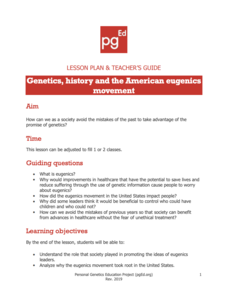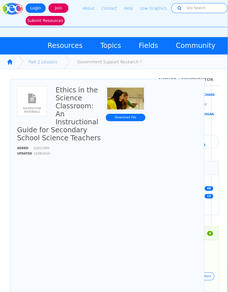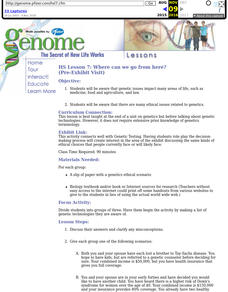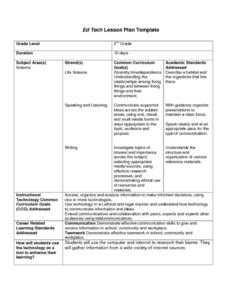Nuffield Foundation
Controlling Body Mass
Many variables impact your body mass, not just diet and exercise. Scholars collect and study data about body mass to better understand the complexity of a sensitive topic. They learn about leptin deficiency, the hypothalamus, and more.
Nuffield Foundation
No Stomach for It: Investigating Antacid Medication
You won't get a stomachache doing an investigative experiment. Pupils simulate the effect of antacids on stomach acid. Obviously, they won't be using real stomach acid; diluted hydrochloric acid serves this purpose.
Curated OER
Bioethics
Students are introduced to the issues surrounding bioethics and begin to discover how some of these values can influence decision making. The exciting part of this lesson is the constructivist method used to engage students of all...
National Center for Case Study Teaching in Science
Life on Mars
Through reading and discussion, aspiring astronomers consider the question of whether or not there was ever life on the planet Mars. Throughout the process, they review how scientific investigations are carried out, examine the...
Curated OER
Coast-to-Coast Book Design-Part 1: What is a book?
In this first of four lessons on book design, students are introduced to the vocabulary of book design through the use of bookwalks and a non-linear PowerPoint presentation in game-show (Jeopardy!) format.
Curated OER
Munching Mice
Students examine different variables and their effects on weight gain in mice. They consider the validity of relating the results in mice to humans.Finally, they discuss the ethics of using animals in experiments.
Curated OER
Low Birthweight Infants
Ninth graders examine why there is a low birth-weight in infants. In this Social Studies lesson, 9th graders read articles on the low birth weight. Students debate the different strategies to help combat low birth weight.
Curated OER
Pine Barrens
Tenth graders study environmental values vs. economic development. In this environmental decisions activity students role play in a policy making setting.
Curated OER
Biotechnology
Students are introduced to the topic of biotechnology. Using the internet, they research issues that have been improved or brought about because of biotechnology advancements. In groups, they participate in activities in which they...
Curated OER
Final Project Presentations: Water Quality
Students synthesize the information they have been researching on water quality to evaluate the potential health risks in a region with arsenic contamination. They prepare and present a persuasive speech that incorporates visuals.
Curated OER
DNA Fingerprinting
Students discuss methods used by forensic scientists and the basics of DNA and how it can be used to identify an individual after reading an article from The New York Times.
Curated OER
Genetic Engineering: Friend or Foe?
Students brainstorm and discuss ways genes can be altered, transferred and cloned. They will complete a subject sampler, opinion paper and prepare to debate their opinion on genetic engineering.
Personal Genetics Education Project
Genetics, history and the American Eugenics Movement
A poignant 20-slide show introduces high schoolers to the amazing accomplishments of genomics and raises the question of eugenics. This lesson is only for mature audiences, as it deals with rape and other sensitive topics, but it is...
Curated OER
Bioethics and the HGP
Students analyze case studies using the rules and principles of ethics. They comprehend which rules and principles of theics are of great importance to the Human Genome Project. Students participate in mock student hearings.
Curated OER
What Kind Of Research Should Our Government Support?
Students are assigned to research review groups, which have to decide which of the proposals to fund. The teacher then leads a discussion focusing on the ethical issues raised in the reasons given for each group's decisions.
Curated OER
Excavation Dig
Students engage in a role-play of a dinosaur excavation dig. They dig through sand to locate buried bones and then discuss the ethics of destroying buildings and other property to get at the fossil remains.
Curated OER
Genome: The Secret of How Life Works
Students become aware that genetic issues impact many areas of life, such as medicine, food and agriculture, and law. They become aware that there are many ethical issues related to genetics.
Curated OER
Genetic Counseling
Young scholars apply the principles of ethical decision making to actual cases. They appreciate that there is usually no one "right" decision. Students compare their conclusions to those of individuals who are in the field.
Curated OER
Biodiversity Debate
Ninth graders debate the positive aspects of dam construction. They discuss how a dam changes the ecosystem. In groups, 9th graders research and gather information for a debate. They state their position and write a report supporting it....
Curated OER
Diversity and Adaptations of Organisms
Eighth graders discover the difference between extinct and endangered animals and discuss the reasons why this has occured. They identify threatened and endangered animals living in their local area as well.
Curated OER
Case Study: Should the Results of the Human Genome Project be Sold for Profit?
Pupils investigate a case study and discuss whether scientists working on the Human Genome Project should be allowed to patent their work. They consider ethical and legal issues, and determine who owns genetic information.
Curated OER
Why Care About Amphibian Population Decline and Malformations?
Students examine the reasons for preserving wildlife. They look at reasons for amphibian malformations and write an essay about the ethical issues that this brings up. They listen to the teacher read quotes about extinction and how the...
Curated OER
Contraceptives: Which Work Best?
Students discover human health by identifying contraceptive methods. In this sexual health activity, students discuss the different methods used to prevent births and STD contraction. Students read assigned text which describes each...
Curated OER
Organisms and Habitats
Second graders investigate biomes and the plants and animals that are native to particular biomes. They participate in a class discussion, conduct Internet research on a selected biome, and create a shoebox biome using their Internet...























